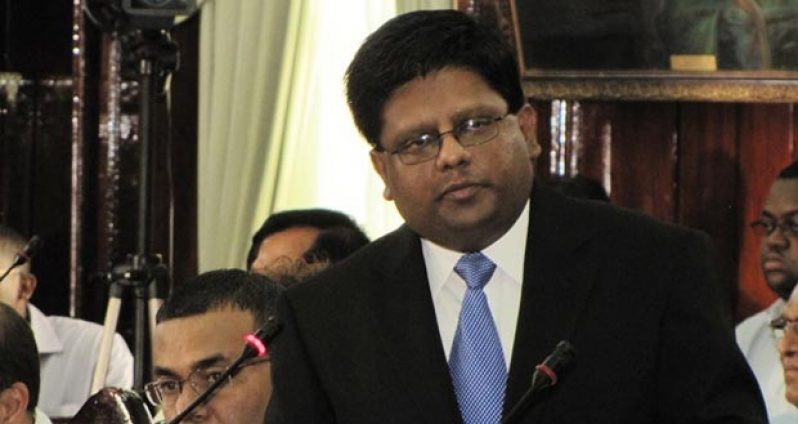-in restoring expenditures for NCN, GINA-AG
THE threat by the political opposition to move to the courts, following the decision of the Finance Minister Dr. Ashni Singh to approve monies for state entities National Communications Network (NCN) and the Government Information Agency (GINA), may be in vain.

Clearing the air on the issue, Legal Affairs Minister Anil Nandlall said that the budgets of the two entities which were cut to $1 each by the parliamentary opposition were restored by his Cabinet colleague in accordance with the law. “I suppose they can attempt to initiate proceedings they feel may be appropriate, but it will be unsuccessful.”
Nandlall said the same constitutional mechanism was used by the Finance Minister in 2012 after government was faced with the same challenge by the opposition. “The Finance Minister utilised the very mechanism and restored the monies which were cut, and presented the same Financial Statement of Excesses to the National Assembly as is required of him by article 318 of the Constitution. They would have some type of impact on the financial accounting record of the country and those who are trained in that area have to deal with that, but speaking as Attorney General and as a lawyer, legally, the minister acted in compliance with the constitution of Guyana, and lawfully,” he stated.
“My interpretation and the minister’s interpretation of Article 318, accord with the interpretation of that article by the Honourable Chief Justice of the country in the budget cut case in his preliminary ruling. Recall he handed down an 18- page ruling in which he detailed a whole host of legal issues and detailed his opinion in the form of a ruling of those issues,” the AG stated.
He added that many of those issues involved included an interpretation of various provisions of the Constitution and article 318 fell to be interpreted by the Chief Justice in his analysis. This interpretation of the Constitution, he said, “is consistent with my interpretation of the Constitution and Dr. Ashni Singh’s interpretation of the Constitution.”
The move by Dr Singh to submit Financial Papers to the National Assembly, detailing expenditures for the two state entities was met with opposition by APNU and AFC parliamentarians. The Attorney General is adamant that his Cabinet colleague acted in accordance with accepted parliamentary norms, and procedures and the Constitution.
“One set of Financial Papers was Statement of Excesses and the other set was Applications for Supplementary Provisions. The Constitution of our country which is the supreme law, allows for monies to be accessed via the National Assembly in a variety of ways. You can do so at the beginning of the financial year by the presentation of what is called the National Budget which is accompanied by an Appropriation Act, and that is the main method by which the government obtains money to be spent.”
The Attorney General noted that Minister Singh is not empowered to just take money and spend, he has to comply with the law, and the National Assembly has a role to play in approving these monies which are required to be spent.
“There are many occasions that will arise which will prove that what has been budgeted is insufficient… in such a situation the constitution of our country provides two additional mechanisms that is, after the Appropriation Act for the Minister of Finance to access monies from the treasury. The Minister of Finance can, if he forms the opinion that there has been insufficient money budgeted or for whatever reason the monies budgeted were spent, and the need still exists for additional monies to be spent on any given matter, he can do one of two things. Firstly, he can go to the National Assembly with a supplementary application requisitioning the Parliament’s approval for a given sum of money for a stated purpose.”
The second mechanism he said is that, “The Constitution expressly allows him to, in those very circumstances, to expend monies, and then as soon as it is reasonably possible, thereafter present to the National Assembly Statement of Excesses showing the monies which have been spent and the purpose for which they have been spent, and seeking what would then be, the ex – post approval of the National Assembly pursuant to Article 317 of the Constitution and that is what the Minister of Finance did.
A final ruling on the legality of the cuts to the 2012 National Budget is expected on December 19, 2013 in the High Court.
(GINA)












